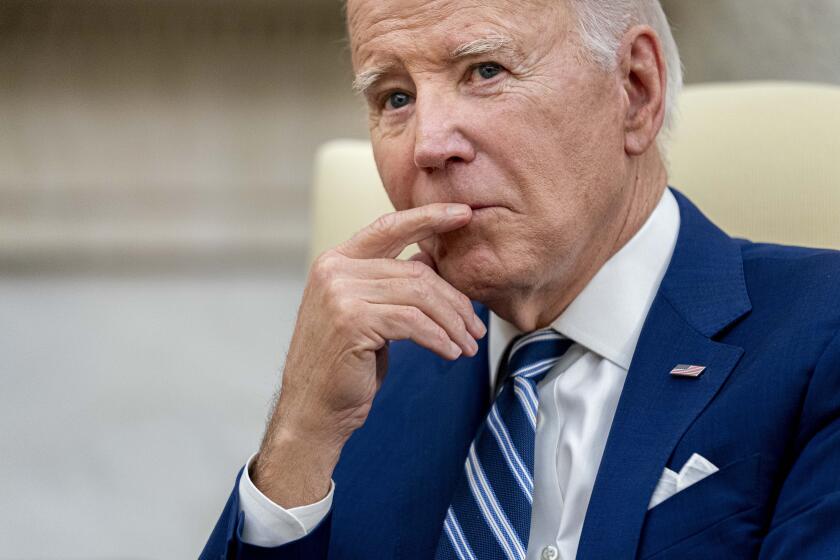Biden’s job approval rating is abysmal. Here’s why he might beat Trump anyway

- Share via
In the era of modern polling, no president has ever won reelection with approval ratings as low as Joe Biden’s at this point in his first term.
For obvious reasons, incumbents have generally needed at least close to 50% approval by election day to win. And despite an improving economy, President Biden’s approval has been stubbornly low — around 40% in polling averages. Getting to 50% by November looks daunting.
Fortunately for those who want Biden to win — or who really just want Donald Trump to lose — that number may not matter as much as it used to.
Like Biden, Obama and Reagan had rough reelection polls. Too many journalists treat polls as predictive, but political professionals use them to inform campaigns.
You may have noticed that a lot of the old rules of politics have passed their expiration dates. They weren’t ironclad laws so much as rules of thumb. Still, it’s a bad time to rely on those rules of thumb.
The long-standing maxim that “as Ohio goes, so goes the nation,” for example, didn’t apply in 2020, when Trump carried the state but lost the election.
The still-widespread conviction that politics is all about money and that donors have outsize influence on elections hasn’t been true for quite a while. Just ask Michael Bloomberg or Ron DeSantis.
From 1888 to 1996, the electoral college result matched the popular result. In 2000 and again in 2016, it didn’t.
The president’s salvation won’t come from pro-Biden fans but by shoring up and adding to the legion of anti-Trump voters.
For decades, successful presidential and congressional candidates followed the rule that you swing to your party’s liberal or conservative base in the primary election and then tack back to the center in the general election. Barack Obama largely ignored that rule, and Trump really ignored it, without repercussions. And most House and Senate candidates now ignore that rule.
That’s because the electorate has sorted to the point where the real challenge to incumbency is usually in primaries, not generals. As a result, candidates increasingly rely on turning out their base rather than persuading voters in the middle.
This points to one reason approval ratings may not matter as much anymore. In a polarized electorate, most people vote against the other party more than they vote for their own.
A recent Quinnipiac University poll found that among voters who dislike both candidates, Biden has a commanding 13-point lead. If that holds, it could be all the president needs.
A second reason these numbers might be unreliable: Trump is essentially running as an incumbent. Normally, presidents who lose don’t run again. And they certainly don’t claim that they didn’t actually lose.
Presidential approval ratings have tended to be predictive because a reelection bid is a referendum on the incumbent’s first term: Do voters want more of the same, or are they unhappy enough to elect a less known and tested challenger? But voters already know what a Trump presidency would be like — or at least can be reminded with a barrage of negative ads.
Trump left office with an approval rating of 34%. This is why Nikki Haley tends to do better than Trump in hypothetical matchups with Biden: She’s a change candidate in a way that Trump can’t be.
It’s true that Trump is currently beating Biden in many hypothetical matchups in battleground states. That should worry Democrats and anyone else who doesn’t want Trump in the White House. But Trump’s favorability ratings are comparable to Biden’s. While Trump has always had a high floor of support — about 34% — he also has a low ceiling, about 48%. Unlike Biden, Trump has never actually been popular.
When even dissatisfied partisans reluctantly “come home” in the general election — basically to vote against the other party — Biden will probably have a much larger pool of “hold your nose” voters to rely on.
The expiration — or at least temporary suspension — of other political rules is relevant too. Republicans were expecting a “red tsunami” in the 2022 midterm elections given Biden’s unpopularity and a struggling economy. But Democrats did shockingly well because they ran against Trumpism and for abortion rights.
Indeed, the old rule that the abortion issue helps Republicans was turned on its head after the Supreme Court overturned Roe vs. Wade. The results of recent state initiatives on the issue suggest Biden could be carried into a second term by abortion rights voters alone.
The president is already opening up a massive gender gap with Trump. The abortion issue surely explains much of it, though the cases against Trump for assaulting and defaming the writer E. Jean Carroll and allegedly paying hush money to cover up an affair with the porn star Stormy Daniels probably contributed. Attacking Taylor Swift, as his most ardent supporters have done recently, won’t help.
All of that said, if you believe a second Trump presidency would be a disaster for the country, rerunning a very unpopular incumbent on a hunch that the old rules no longer apply still seems like a risky bet. But the old rule that political parties make decisions based on what’s best for them — or the country — expired a long time ago.
More to Read
A cure for the common opinion
Get thought-provoking perspectives with our weekly newsletter.
You may occasionally receive promotional content from the Los Angeles Times.












